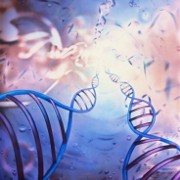 Photo: Getty Images
Photo: Getty Images
Rett syndrome is a neurological disorder on the autism spectrum that almost exclusively happens to girls. It is sometimes misdiagnosed as cerebral palsy. Research indicates that Rett syndrome is linked to a defect in the methl-CpG-binding protein 2 (MeCP2) gene.
The MeCP2 gene is on the X chromosome. Miscarriage or stillbirth are usually the outcome for males with a defective MeCP2 gene, because they only have one X chromosome and it's carrying this defect. At best, they can only survive a short time after birth.
Females, with their two X chromosomes, can survive, but they may have Rett syndrome.
Symptoms of Rett symptom may include apraxia (inability to perform motor functions), breathing abnormalities, drooling, and floppy arms and legs. Often present are cognitive disabilities, scoliosis, seizures, gastrointestinal problems and difficulties with speech.
Head size may be reduced. Wringing of the hands and other repetitive movements may replace functional hand usage. Walking may be unsteady and stiff.
The child may retreat from social communication. Development in all areas may regress.
Rett syndrome is not usually genetic in the commonly held sense, not passed on from parent to child. But it is genetic in the sense that something happens to the genes of the child in early development.
In most cases, Rett syndrome seems to hit at random. Less than 1 percent of Rett cases) carry a mutation of MeCP2.
Rett syndrome symptoms can vary widely from one patient to the next. Researchers at the Salk Institute for Biological Studies wanted to know why this was.
They found that the MeCP2 mutated gene plays a role in this panorama of symptoms. In a healthy brain, MeCP2 helps regulate gene activity. Normally, it controls the movement of busy L1 retrotransposons.
A transposon is a naturally occurring DNA sequence that can move about in a genome. A retrotransposon is a transposon that has been copied from the RNA.
The Salk experiment using mice saw greatly increased mobility of these L1 retrotransposons where it shouldn't be happening, in the brains of the mice with the gene mutation. Conversely, brains of mice without the mutation did not show this excess activity.
When investigation was then carried out on human cells, the mobility in cells from the Rett patient was twice that of the control patient's. There were far more L1 elements in the brains of Rett patients than in a non-affected brain.
Research is in early stages but it is adding to our knowledge of Rett syndrome and the autism spectrum. New data was also found that may bring greater understanding about psychiatric disorders like schizophrenia.
The report was published in the November 18, 2010 issue of the journal Nature.
Resources:
Rett syndrome
http://www.ncbi.nlm.nih.gov/pubmedhealth/PMH0002503/
Rett Syndrome Fact Sheet
http://www.ninds.nih.gov/disorders/rett/detail_rett.htm
MECP2
http://ghr.nlm.nih.gov/gene/MECP2
Molecular genetics of Rett syndrome and clinical spectrum of MECP2 mutations.
http://www.ncbi.nlm.nih.gov/pubmed/11262731
Rett syndrome mobilizes jumping genes in the brain
http://www.eurekalert.org/pub_releases/2010-11/si-rsm111110.php
Possible Treatment For Neurological Disorder Rett Syndrome -- Most Common Basis Of Autism in Girls
http://www.sciencedaily.com/releases/2009/02/090209205047.htm
Visit Jody's website and blog at http://www.ncubator.ca and http://ncubator.ca/blogger





Add a CommentComments
There are no comments yet. Be the first one and get the conversation started!